 |
|
At 17, Bonamassa co-founded the band Bloodline. Billed as 'Smokin' Joe Bonamssa' on the album's sleeve, he was joined by a number of musical offspring: bassist and vocalist Berry Oakley Jr (Berry Oakley's kid), drummer Erin Davis (son of Miles) and rhythm guitarist Waylon Krieger (Robby Krieger's heir).
They were signed in 1994 and released one album of hit and miss blues rock. If you're curious, here's a video of the group performing live. |
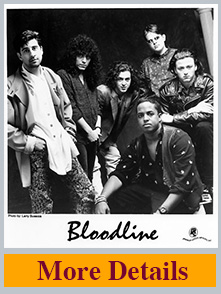 |
 |
|
Bonamassa finally released his first solo album aged 23. Produced by Tom Dowd (Derek And The Dominos) and featuring guest appearances from Rick Derringer, Leslie West and Gregg Allman, this raw-as-a-bag-of-blisters offering features classic covers alongside a handful of originals.
At this point Bonamassa's vocals were still a brusque growl, adding grittiness to full throttle versions of Rory Gallagher's Cradle Rock, Free's Walk In My Shadow and Albert King's Burn Down That Bridge. A couple of self penned gems hinted at what was to come. Miss You Hate You cracks out a catchy chorus while Colour And The Shape is a precursor to the cowboy-cool-at-dusk delivery that characterises his later output. As a start, not bad at all. |
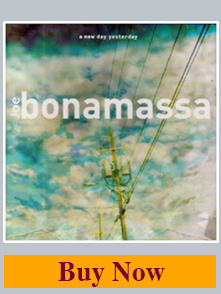
|
 |
|
This sophomore beauty is the most underrated in Bonamassa's back catalogue. Two things mark it out from the rest: aside from being his only release to feature almost entirely original material, there's very little blues on display.
It's a big commercial rock record bulging with cracking drive time Americana anthems and soaring melodies. From the ballsy roar of Lie #1 to the euphoric emancipation of My Mistake, these songs should be continuously rotated on classic American rock radio due to their wonderfully timeless sound. |
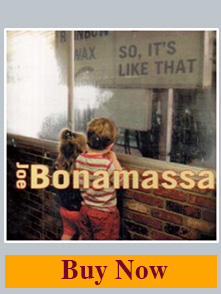 |
 |
|
An interesting release, given that the studio album of the same name only came out a few months earlier. However, where that record feels slightly stiff, this is like a musical fireworks display.
The songs have a spark they previously lacked as the band reinvigorate them with an untameable verve and spontaneity that only young, hungry musicians can deliver. |
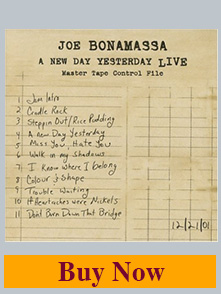 |
 |
|
Following the previous album's commercial leanings, Bonamassa returned to the blues on this storming collection. According to the man himself, there are fans who'd be happy for him to spend the rest of his career making 'Blues Deluxe' volumes two through infinity.
It's easy to see why. After a shufflin' cruise through BB King's You Upset Me Baby he unfurls a vitriolic thunder crack on John Lee Hooker's Burning Hell, which seethes with latent fury and religious angst. Woke Up Dreaming highlights blinding acoustic dexterity and has become a live favourite ever since. |
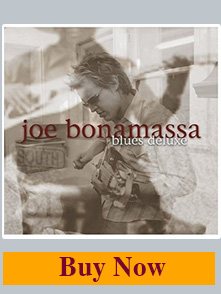 |
 |
|
This second collaboration between Bonamassa and Shirley set the template for all their future projects together: never repeat, always evolve. Originally conceived as a purely acoustic album, the final result was a mixture of amp free numbers and full-fat rockers.
Dirt In My Pocket roars with a gnarly slide riff, a smooth rendition of John Mayall's Another Kind Of Love purrs with laid back cool and a dramatic cover of Charles Brown's Black Night features a cascade of enthralling licks. The acoustic side is equally impressive.
A graceful take on Bad Company's Seagull is a lilting jewel, Richmond full of homesick pathos and Jelly Roll a plucking delight. Most importantly, the show stopping title track took Tim Curry's profane original and turned it into a haunting ballad par excellence. |
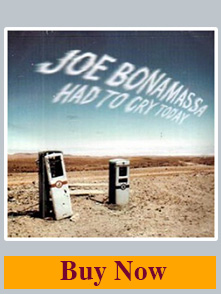 |
 |
|
After a rare two year break Bonamassa returned with his strongest album and a collaborator who'd become his best friend, harshest critic and muse for the next seven years and counting: producer Kevin Shirley. His influence turned Bonamassa from plucky prospect into genuine title contender.
Beginning with the booming funereal beat of Charlie Patton's High Water Everywhere, this is no ordinary Joe. The song's lead melodies weep with a divine tonality and the whole album sounds bigger, bolder and better than anything that preceded it. |
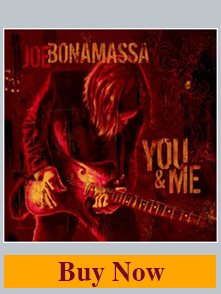 |
 |
|
Here's a treat from the archives. Bonamassa and his original three piece band in a small venue, unleashing a scalding performance that leaps right out of the screen. Recorded at Burg Satzvey, this pulsating DVD finds a younger Bonamassa with long hair and no sign of a well tailored suit!
There may only be eleven tracks, but the band dispatch them with a rocket-propelled gusto that incorporates riveting jams and mesmerising improvisation |
 |
 |
|
This second collaboration between Bonamassa and Shirley set the template for all their future projects together: never repeat, always evolve. Originally conceived as a purely acoustic album, the final result was a mixture of amp free numbers and full-fat rockers. Dirt In My Pocket roars with a gnarly slide riff, a smooth rendition of John Mayall's Another Kind Of Love purrs with laid back cool and a dramatic cover of Charles Brown's Black Night features a cascade of enthralling licks.
The acoustic side is equally impressive. A graceful take on Bad Company's Seagull is a lilting jewel, Richmond full of homesick pathos and Jelly Roll a plucking delight. Most importantly, the show stopping title track took Tim Curry's profane original and turned it into a haunting ballad par excellence. |
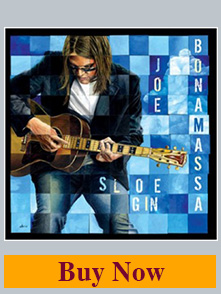 |
 |
|
Bonamassa and Shirley hit the jackpot on album number three, a record many cite as their favourite. From the title track's Zeppelin-worshipping riff and eastern strings, to the pedal meets metal groove of Last Kiss and bruising Story Of A Quarryman, dark rhythms and swampy blues are the order of the day.
The cover songs are typically inspired, with Sam Brown's Stop given a Gary Moore makeover and the saloon shuffle of Tom Waits' Jockey Full Of Bourbon boasting a corking chorus and poetic word play. Bonamassa's own compositions were increasingly impressive too, showing a genuine depth of emotion on Happier Times. |
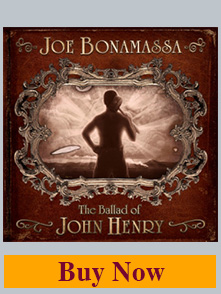 |
 |
|
This double live album - recorded at various gigs around the globe - is a great example of Bonamassa's stage sorcery.
The conjoining of India with a mellow n' misty Mountain Time, a revved up charge through ZZ Top's Just Got Paid and flash acoustic stunner Woke Up Dreaming all show why he's so highly regarded as a live performer. |
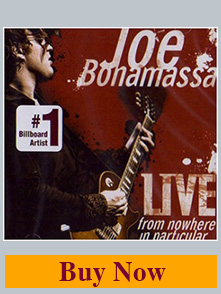 |
 |
|
This must have been when Joe Bonamassa felt he'd truly arrived. Selling out a venue he'd dreamed of as a kid after listening to Cream light up the place, and now trading licks with Clapton on the very same stage.
With two drummers and an augmented band that included sax, trumpet and trombone, Bonamassa seized the moment and played a set that's as damn near perfect as you'll ever hear. |
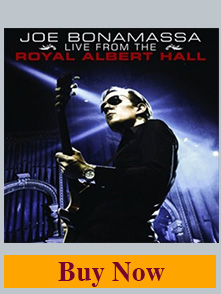 |
 |
|
Something about this album isn't quite right. In a bid to strip away the grandeur of 'John Henry' mistakes were made. Shirley's production is so muddy it sounds like it was recorded in a Glastonbury field and there's an inconsistent feel as heavy blues mix uncomfortably with the exotic instrumental work of Greek musicians from the island where they cut the record.
Faults aside, there's still some good stuff. The clanging cadence of When The Fire Hits The Sea and the gorgeous Quarrymen's Lament both beguile, while the Jimmy Page meets St Nick attack of Blue And Evil batters with malice. |
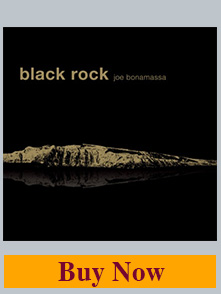 |
 |
|
Although recently ending in a public falling out between Bonamassa and Glenn Hughes, this side project gave us three albums of 1970s hard rock with a powerful Zeppelin meets Purple punch. Masterminded by Kevin Shirley and built around the talents of Bonamassa and former Deep Purple singer/bassist Hughes, the band also incorporated ex-Dream Theater keyboard maestro Derek Sherinian and a drummer by the name of Jason Bonham. You may have heard of his dad.
The older generation may have wet their pants at the prospect of a band playing vintage hard rock, but this is an uneven début. Hughes continually squawks beyond the limits of his range, making tracks like The Great Divide almost unlistenable. Furthermore, Shirley's production is so bottom heavy it's as if the treble knob on the mixing desk is broken. Although when it's good, it's tres good. The pulsing chug of One Last Soul deserves to be on a better album and the title track's monstrous rumble would have been tremendous had the guitar not sounded so flat. |
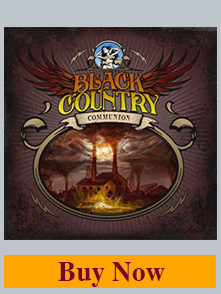 |
 |
|
After the misfiring 'Black Rock' normal service was resumed on an album that feels like the natural successor to 'The Ballad Of John Henry'. The theme here is Americana, and its succulent sounds are like a musical road trip around the good old US of A.
The onomatopoeic intro to Slow Train begins the journey with a blast of chugging delta blues, the title track could be John Barry scoring an episode of Deadwood and the rock n' rollin' country of Tennessee Plates features a lively duet between Joe and John Hiatt. Black Lung Heartache, meanwhile, is an astonishing Bonamassa original, dancing like a pixie with folky Led Zep 3 verses before bludgeoning rhythms and ethereal licks storm out the speakers. |
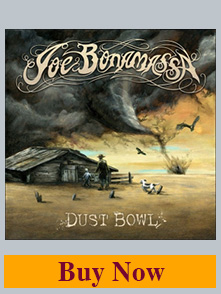 |
 |
|
| This is more like it! The production is improved, the chemistry more palpable and the songs stronger. The Outsider channels classic Deep Purple with Bonamassa and Sherinian conjuring up memories of Blackmore and Lord as they trade ferocious solos, while Man In The Middle has an incredibly nasty riff and the glacially emotive Cold is a moving account of Hughes' battle with addictions. |
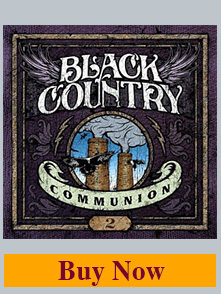 |
 |
|
The chemistry here is wonderful and under the guidance of Shirley, Hart and Bonamassa collaborated on a heart-melting collection of soul covers from the likes of Etta James, Aretha Franklin and Billy Holiday.
Hart's voice is divine - powerful, emotional and full of tremulous spirit. Bonamassa does his bit too, knocking out a chunky riff on For My Friends, co-crooning the jaunty Well, Well and cutting free with a stunning solo on I'll Take Care Of You. |
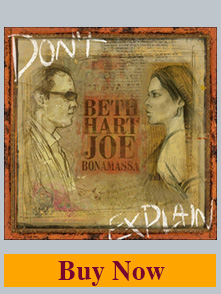 |
 |
|
| Featuring a completely different setlist to the Royal Albert Hall gig, this concert focuses on 'Dust Bowl' and 'Black Rock' material with older tracks like The River and Cradle Rock thrown into the mix. Although it's enjoyable to hear songs that don't often get a live airing, the highlights are the guest appearances. Paul Rodgers rocks the house with piercing renditions of Fire And Water and Walk In My Shadows, while John Hiatt brings his sinister tones to a couple of his own nefarious gems. |
 |
 |
|
| In our review of this album we called it an “exceptional release that strips back the epic soundscapes of Bonamassa 's recent work, delivering a back-to-basics, blues rock master class that's so immediate and energised you could close your eyes and swear you're listening to a live recording”. One year on, we're not going to argue with ourselves. |
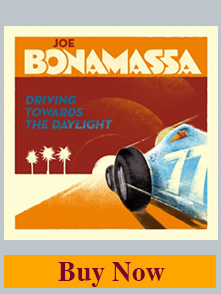 |
 |
|
| This live release draws from their first two albums and finishes with a barn storming rendition of Deep Purple's Burn. Whereas Black Country Communion occasionally felt too rigid on their studio cuts, here they soared with an electrifying immediacy. |
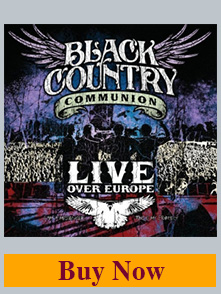 |
 |
|
With Bonamassa largely unavailable due to his solo schedule, this is essentially a Glenn Hughes album fleshed out by the BCC boys.
Ironically, it's the band's most consistent body of work, with the material having a lighter feel than the previous records' pummelling assaults. At least with songs like Midnight Sun, Afterglow, Crawl and The Giver they went out on a high. |
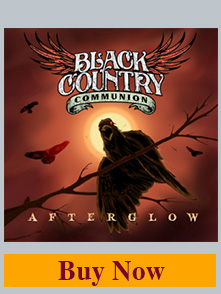 |
 |
|
Led by Bonamassa's touring drummer Tal Bergman, this funky posse dropped an album of instrumental cuts that showcase their respective bad ass talents, sounding like the soundtrack to a '70s porn film in the process.
The compositions are intriguing, but the quality isn't sustained and it's easy to lose concentration when the jams become over long and unfocused. |
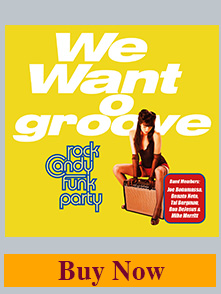 |
 |
|
While their début was an undoubted success, this follow up blew it, and any notion of a difficult second album, out of the water.
With sultry covers of Tina Turner, Bille Holiday, Etta and Melody Gardot, it swings, soothes, rocks n' rolls with a kinetic joie de vivre that's thoroughly contagious. When Bonamassa describes it as “one of the things in my career I'm most proud of” you know it's something special. |
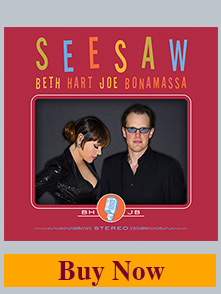 |
 |
|
For fans of Bonamassa's acoustic wizardry a la Woke Up Dreaming, this is manna from heaven.
Without any electricity, Bonamassa and three multi-talented players from around the world deliver beautifully sparse takes on his best known material. |
 |
| |
|

